Assignment about Fundamentals of Mental Health
VerifiedAdded on 2022/09/21
|7
|1579
|41
Assignment
AI Summary
Contribute Materials
Your contribution can guide someone’s learning journey. Share your
documents today.
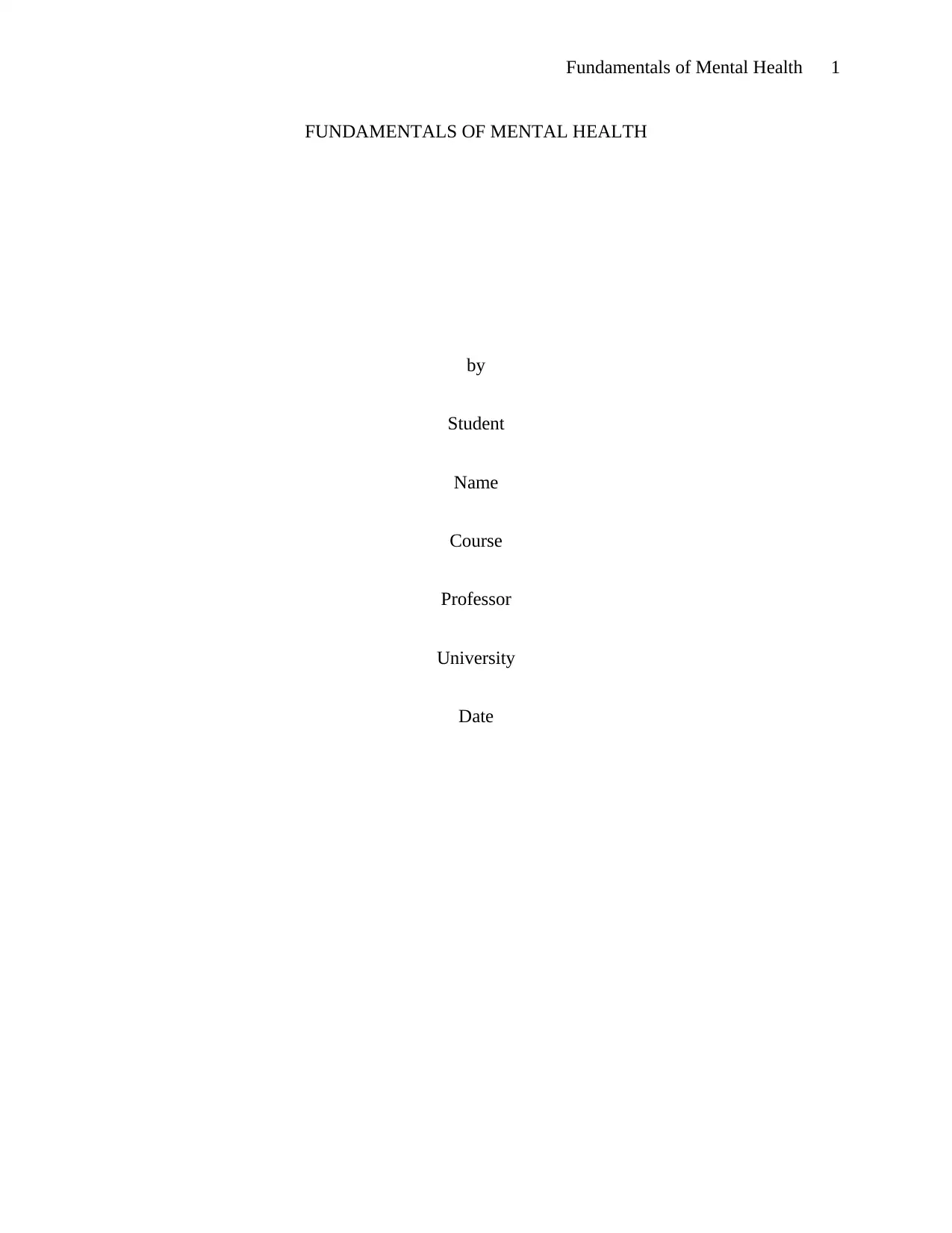
Fundamentals of Mental Health 1
FUNDAMENTALS OF MENTAL HEALTH
by
Student
Name
Course
Professor
University
Date
FUNDAMENTALS OF MENTAL HEALTH
by
Student
Name
Course
Professor
University
Date
Secure Best Marks with AI Grader
Need help grading? Try our AI Grader for instant feedback on your assignments.
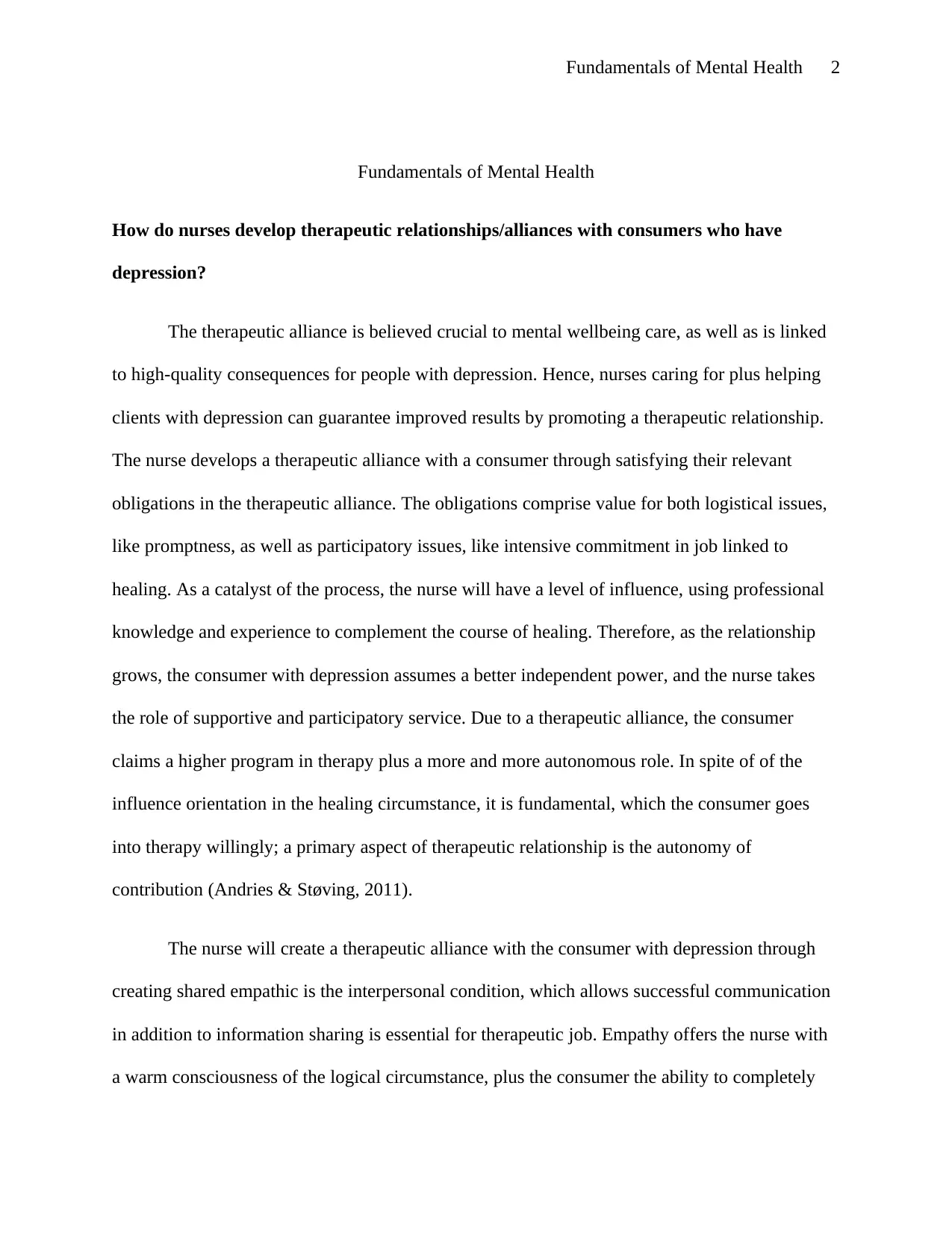
Fundamentals of Mental Health 2
Fundamentals of Mental Health
How do nurses develop therapeutic relationships/alliances with consumers who have
depression?
The therapeutic alliance is believed crucial to mental wellbeing care, as well as is linked
to high-quality consequences for people with depression. Hence, nurses caring for plus helping
clients with depression can guarantee improved results by promoting a therapeutic relationship.
The nurse develops a therapeutic alliance with a consumer through satisfying their relevant
obligations in the therapeutic alliance. The obligations comprise value for both logistical issues,
like promptness, as well as participatory issues, like intensive commitment in job linked to
healing. As a catalyst of the process, the nurse will have a level of influence, using professional
knowledge and experience to complement the course of healing. Therefore, as the relationship
grows, the consumer with depression assumes a better independent power, and the nurse takes
the role of supportive and participatory service. Due to a therapeutic alliance, the consumer
claims a higher program in therapy plus a more and more autonomous role. In spite of of the
influence orientation in the healing circumstance, it is fundamental, which the consumer goes
into therapy willingly; a primary aspect of therapeutic relationship is the autonomy of
contribution (Andries & Støving, 2011).
The nurse will create a therapeutic alliance with the consumer with depression through
creating shared empathic is the interpersonal condition, which allows successful communication
in addition to information sharing is essential for therapeutic job. Empathy offers the nurse with
a warm consciousness of the logical circumstance, plus the consumer the ability to completely
Fundamentals of Mental Health
How do nurses develop therapeutic relationships/alliances with consumers who have
depression?
The therapeutic alliance is believed crucial to mental wellbeing care, as well as is linked
to high-quality consequences for people with depression. Hence, nurses caring for plus helping
clients with depression can guarantee improved results by promoting a therapeutic relationship.
The nurse develops a therapeutic alliance with a consumer through satisfying their relevant
obligations in the therapeutic alliance. The obligations comprise value for both logistical issues,
like promptness, as well as participatory issues, like intensive commitment in job linked to
healing. As a catalyst of the process, the nurse will have a level of influence, using professional
knowledge and experience to complement the course of healing. Therefore, as the relationship
grows, the consumer with depression assumes a better independent power, and the nurse takes
the role of supportive and participatory service. Due to a therapeutic alliance, the consumer
claims a higher program in therapy plus a more and more autonomous role. In spite of of the
influence orientation in the healing circumstance, it is fundamental, which the consumer goes
into therapy willingly; a primary aspect of therapeutic relationship is the autonomy of
contribution (Andries & Støving, 2011).
The nurse will create a therapeutic alliance with the consumer with depression through
creating shared empathic is the interpersonal condition, which allows successful communication
in addition to information sharing is essential for therapeutic job. Empathy offers the nurse with
a warm consciousness of the logical circumstance, plus the consumer the ability to completely
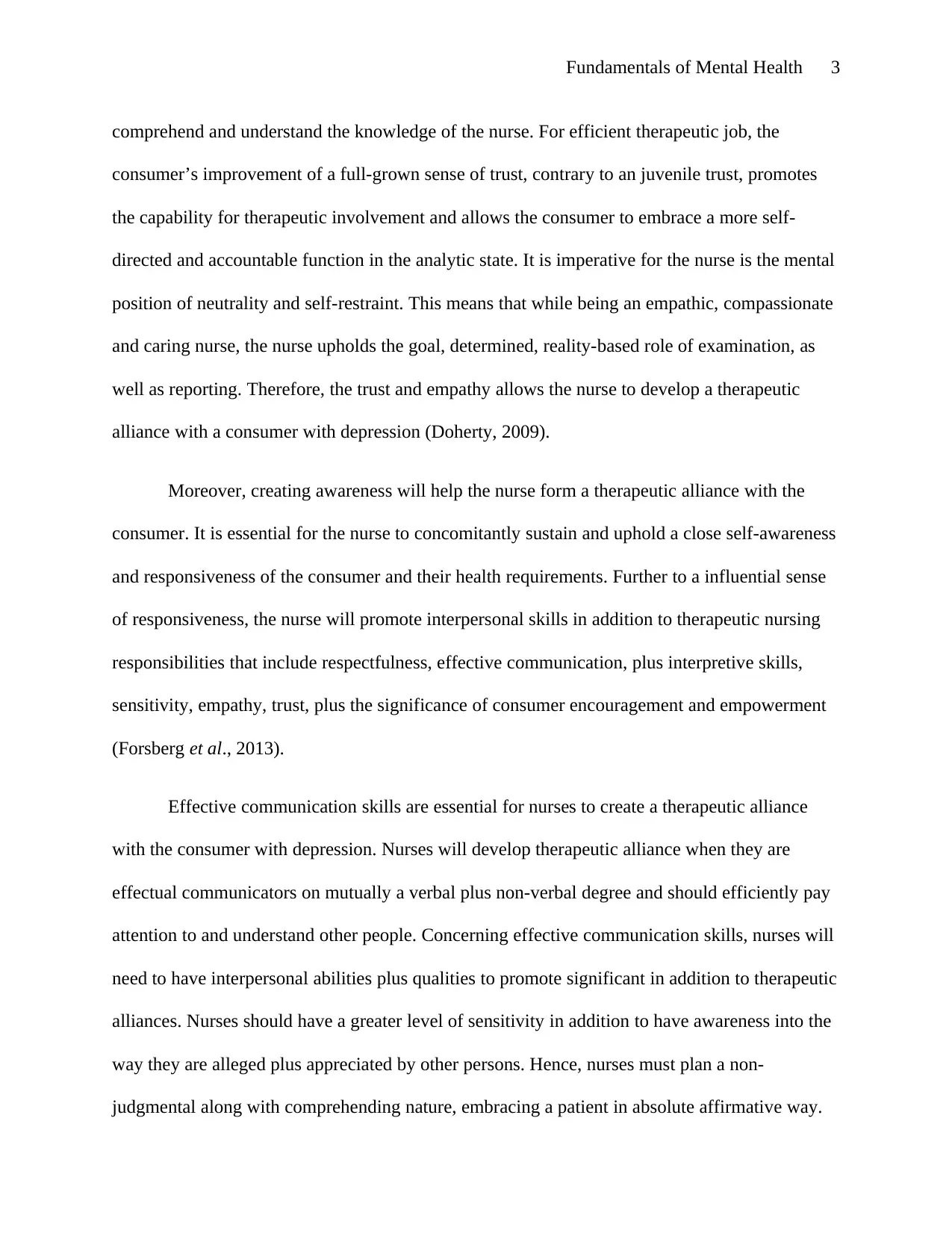
Fundamentals of Mental Health 3
comprehend and understand the knowledge of the nurse. For efficient therapeutic job, the
consumer’s improvement of a full-grown sense of trust, contrary to an juvenile trust, promotes
the capability for therapeutic involvement and allows the consumer to embrace a more self-
directed and accountable function in the analytic state. It is imperative for the nurse is the mental
position of neutrality and self-restraint. This means that while being an empathic, compassionate
and caring nurse, the nurse upholds the goal, determined, reality-based role of examination, as
well as reporting. Therefore, the trust and empathy allows the nurse to develop a therapeutic
alliance with a consumer with depression (Doherty, 2009).
Moreover, creating awareness will help the nurse form a therapeutic alliance with the
consumer. It is essential for the nurse to concomitantly sustain and uphold a close self-awareness
and responsiveness of the consumer and their health requirements. Further to a influential sense
of responsiveness, the nurse will promote interpersonal skills in addition to therapeutic nursing
responsibilities that include respectfulness, effective communication, plus interpretive skills,
sensitivity, empathy, trust, plus the significance of consumer encouragement and empowerment
(Forsberg et al., 2013).
Effective communication skills are essential for nurses to create a therapeutic alliance
with the consumer with depression. Nurses will develop therapeutic alliance when they are
effectual communicators on mutually a verbal plus non-verbal degree and should efficiently pay
attention to and understand other people. Concerning effective communication skills, nurses will
need to have interpersonal abilities plus qualities to promote significant in addition to therapeutic
alliances. Nurses should have a greater level of sensitivity in addition to have awareness into the
way they are alleged plus appreciated by other persons. Hence, nurses must plan a non-
judgmental along with comprehending nature, embracing a patient in absolute affirmative way.
comprehend and understand the knowledge of the nurse. For efficient therapeutic job, the
consumer’s improvement of a full-grown sense of trust, contrary to an juvenile trust, promotes
the capability for therapeutic involvement and allows the consumer to embrace a more self-
directed and accountable function in the analytic state. It is imperative for the nurse is the mental
position of neutrality and self-restraint. This means that while being an empathic, compassionate
and caring nurse, the nurse upholds the goal, determined, reality-based role of examination, as
well as reporting. Therefore, the trust and empathy allows the nurse to develop a therapeutic
alliance with a consumer with depression (Doherty, 2009).
Moreover, creating awareness will help the nurse form a therapeutic alliance with the
consumer. It is essential for the nurse to concomitantly sustain and uphold a close self-awareness
and responsiveness of the consumer and their health requirements. Further to a influential sense
of responsiveness, the nurse will promote interpersonal skills in addition to therapeutic nursing
responsibilities that include respectfulness, effective communication, plus interpretive skills,
sensitivity, empathy, trust, plus the significance of consumer encouragement and empowerment
(Forsberg et al., 2013).
Effective communication skills are essential for nurses to create a therapeutic alliance
with the consumer with depression. Nurses will develop therapeutic alliance when they are
effectual communicators on mutually a verbal plus non-verbal degree and should efficiently pay
attention to and understand other people. Concerning effective communication skills, nurses will
need to have interpersonal abilities plus qualities to promote significant in addition to therapeutic
alliances. Nurses should have a greater level of sensitivity in addition to have awareness into the
way they are alleged plus appreciated by other persons. Hence, nurses must plan a non-
judgmental along with comprehending nature, embracing a patient in absolute affirmative way.
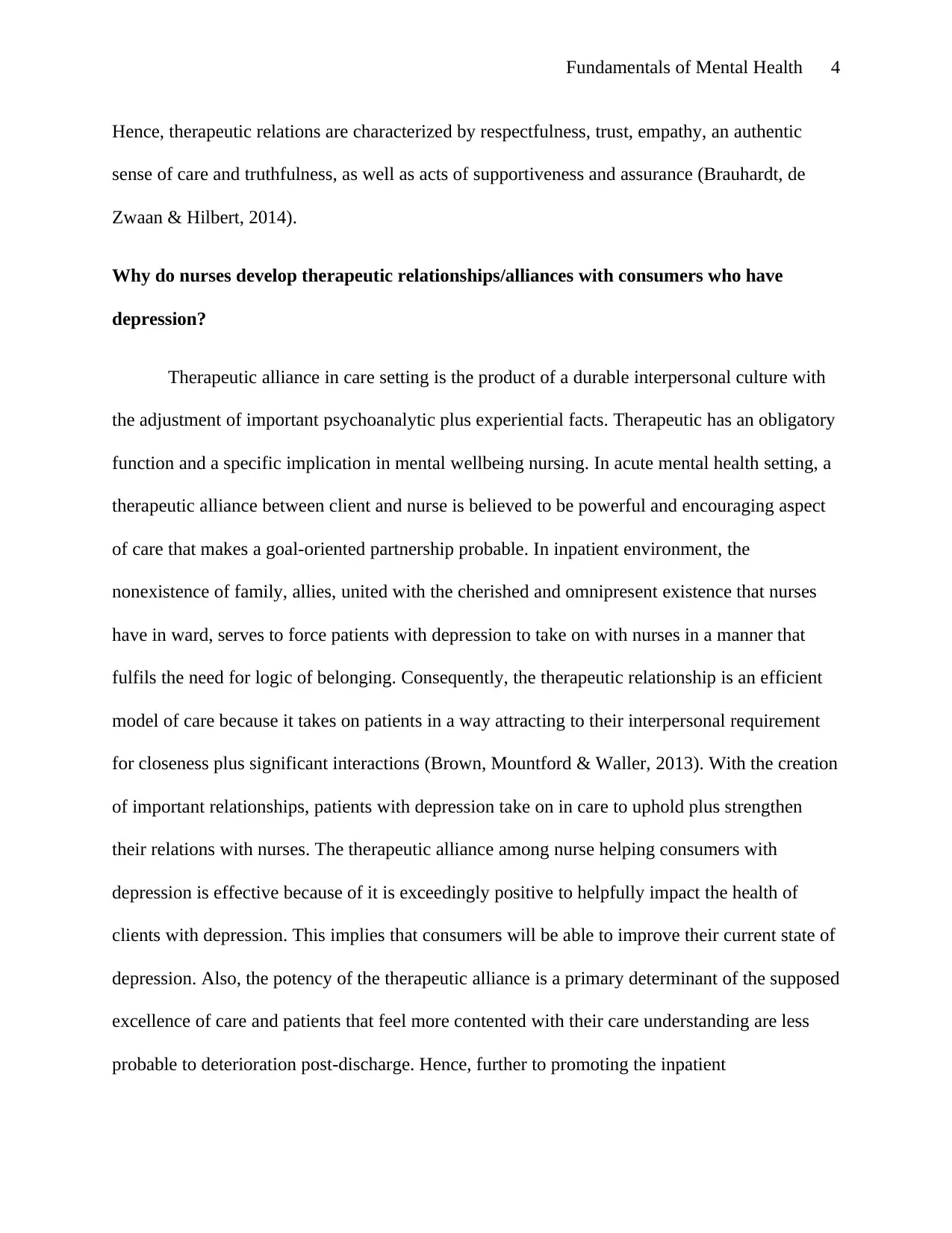
Fundamentals of Mental Health 4
Hence, therapeutic relations are characterized by respectfulness, trust, empathy, an authentic
sense of care and truthfulness, as well as acts of supportiveness and assurance (Brauhardt, de
Zwaan & Hilbert, 2014).
Why do nurses develop therapeutic relationships/alliances with consumers who have
depression?
Therapeutic alliance in care setting is the product of a durable interpersonal culture with
the adjustment of important psychoanalytic plus experiential facts. Therapeutic has an obligatory
function and a specific implication in mental wellbeing nursing. In acute mental health setting, a
therapeutic alliance between client and nurse is believed to be powerful and encouraging aspect
of care that makes a goal-oriented partnership probable. In inpatient environment, the
nonexistence of family, allies, united with the cherished and omnipresent existence that nurses
have in ward, serves to force patients with depression to take on with nurses in a manner that
fulfils the need for logic of belonging. Consequently, the therapeutic relationship is an efficient
model of care because it takes on patients in a way attracting to their interpersonal requirement
for closeness plus significant interactions (Brown, Mountford & Waller, 2013). With the creation
of important relationships, patients with depression take on in care to uphold plus strengthen
their relations with nurses. The therapeutic alliance among nurse helping consumers with
depression is effective because of it is exceedingly positive to helpfully impact the health of
clients with depression. This implies that consumers will be able to improve their current state of
depression. Also, the potency of the therapeutic alliance is a primary determinant of the supposed
excellence of care and patients that feel more contented with their care understanding are less
probable to deterioration post-discharge. Hence, further to promoting the inpatient
Hence, therapeutic relations are characterized by respectfulness, trust, empathy, an authentic
sense of care and truthfulness, as well as acts of supportiveness and assurance (Brauhardt, de
Zwaan & Hilbert, 2014).
Why do nurses develop therapeutic relationships/alliances with consumers who have
depression?
Therapeutic alliance in care setting is the product of a durable interpersonal culture with
the adjustment of important psychoanalytic plus experiential facts. Therapeutic has an obligatory
function and a specific implication in mental wellbeing nursing. In acute mental health setting, a
therapeutic alliance between client and nurse is believed to be powerful and encouraging aspect
of care that makes a goal-oriented partnership probable. In inpatient environment, the
nonexistence of family, allies, united with the cherished and omnipresent existence that nurses
have in ward, serves to force patients with depression to take on with nurses in a manner that
fulfils the need for logic of belonging. Consequently, the therapeutic relationship is an efficient
model of care because it takes on patients in a way attracting to their interpersonal requirement
for closeness plus significant interactions (Brown, Mountford & Waller, 2013). With the creation
of important relationships, patients with depression take on in care to uphold plus strengthen
their relations with nurses. The therapeutic alliance among nurse helping consumers with
depression is effective because of it is exceedingly positive to helpfully impact the health of
clients with depression. This implies that consumers will be able to improve their current state of
depression. Also, the potency of the therapeutic alliance is a primary determinant of the supposed
excellence of care and patients that feel more contented with their care understanding are less
probable to deterioration post-discharge. Hence, further to promoting the inpatient
Secure Best Marks with AI Grader
Need help grading? Try our AI Grader for instant feedback on your assignments.
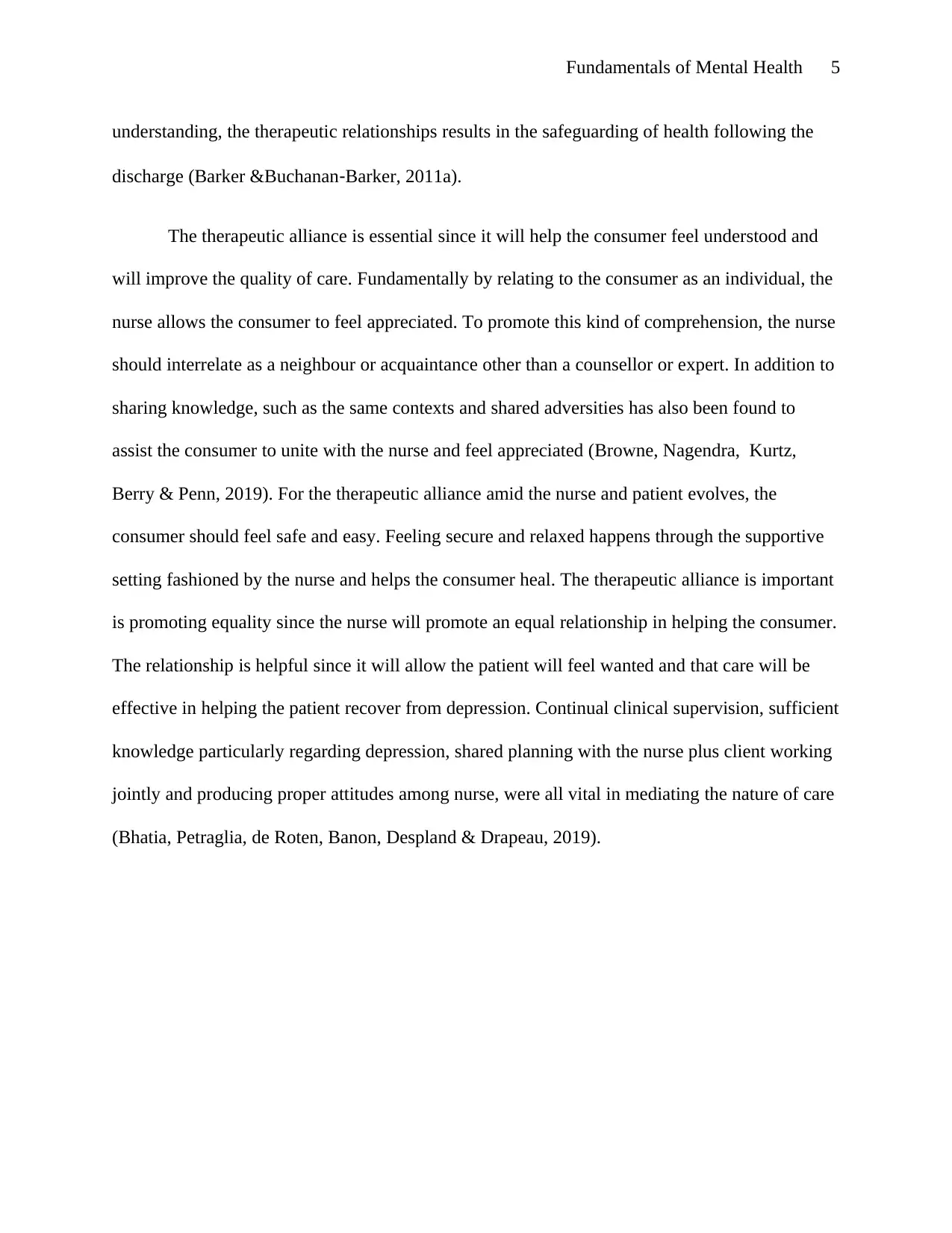
Fundamentals of Mental Health 5
understanding, the therapeutic relationships results in the safeguarding of health following the
discharge (Barker &Buchanan‐Barker, 2011a).
The therapeutic alliance is essential since it will help the consumer feel understood and
will improve the quality of care. Fundamentally by relating to the consumer as an individual, the
nurse allows the consumer to feel appreciated. To promote this kind of comprehension, the nurse
should interrelate as a neighbour or acquaintance other than a counsellor or expert. In addition to
sharing knowledge, such as the same contexts and shared adversities has also been found to
assist the consumer to unite with the nurse and feel appreciated (Browne, Nagendra, Kurtz,
Berry & Penn, 2019). For the therapeutic alliance amid the nurse and patient evolves, the
consumer should feel safe and easy. Feeling secure and relaxed happens through the supportive
setting fashioned by the nurse and helps the consumer heal. The therapeutic alliance is important
is promoting equality since the nurse will promote an equal relationship in helping the consumer.
The relationship is helpful since it will allow the patient will feel wanted and that care will be
effective in helping the patient recover from depression. Continual clinical supervision, sufficient
knowledge particularly regarding depression, shared planning with the nurse plus client working
jointly and producing proper attitudes among nurse, were all vital in mediating the nature of care
(Bhatia, Petraglia, de Roten, Banon, Despland & Drapeau, 2019).
understanding, the therapeutic relationships results in the safeguarding of health following the
discharge (Barker &Buchanan‐Barker, 2011a).
The therapeutic alliance is essential since it will help the consumer feel understood and
will improve the quality of care. Fundamentally by relating to the consumer as an individual, the
nurse allows the consumer to feel appreciated. To promote this kind of comprehension, the nurse
should interrelate as a neighbour or acquaintance other than a counsellor or expert. In addition to
sharing knowledge, such as the same contexts and shared adversities has also been found to
assist the consumer to unite with the nurse and feel appreciated (Browne, Nagendra, Kurtz,
Berry & Penn, 2019). For the therapeutic alliance amid the nurse and patient evolves, the
consumer should feel safe and easy. Feeling secure and relaxed happens through the supportive
setting fashioned by the nurse and helps the consumer heal. The therapeutic alliance is important
is promoting equality since the nurse will promote an equal relationship in helping the consumer.
The relationship is helpful since it will allow the patient will feel wanted and that care will be
effective in helping the patient recover from depression. Continual clinical supervision, sufficient
knowledge particularly regarding depression, shared planning with the nurse plus client working
jointly and producing proper attitudes among nurse, were all vital in mediating the nature of care
(Bhatia, Petraglia, de Roten, Banon, Despland & Drapeau, 2019).
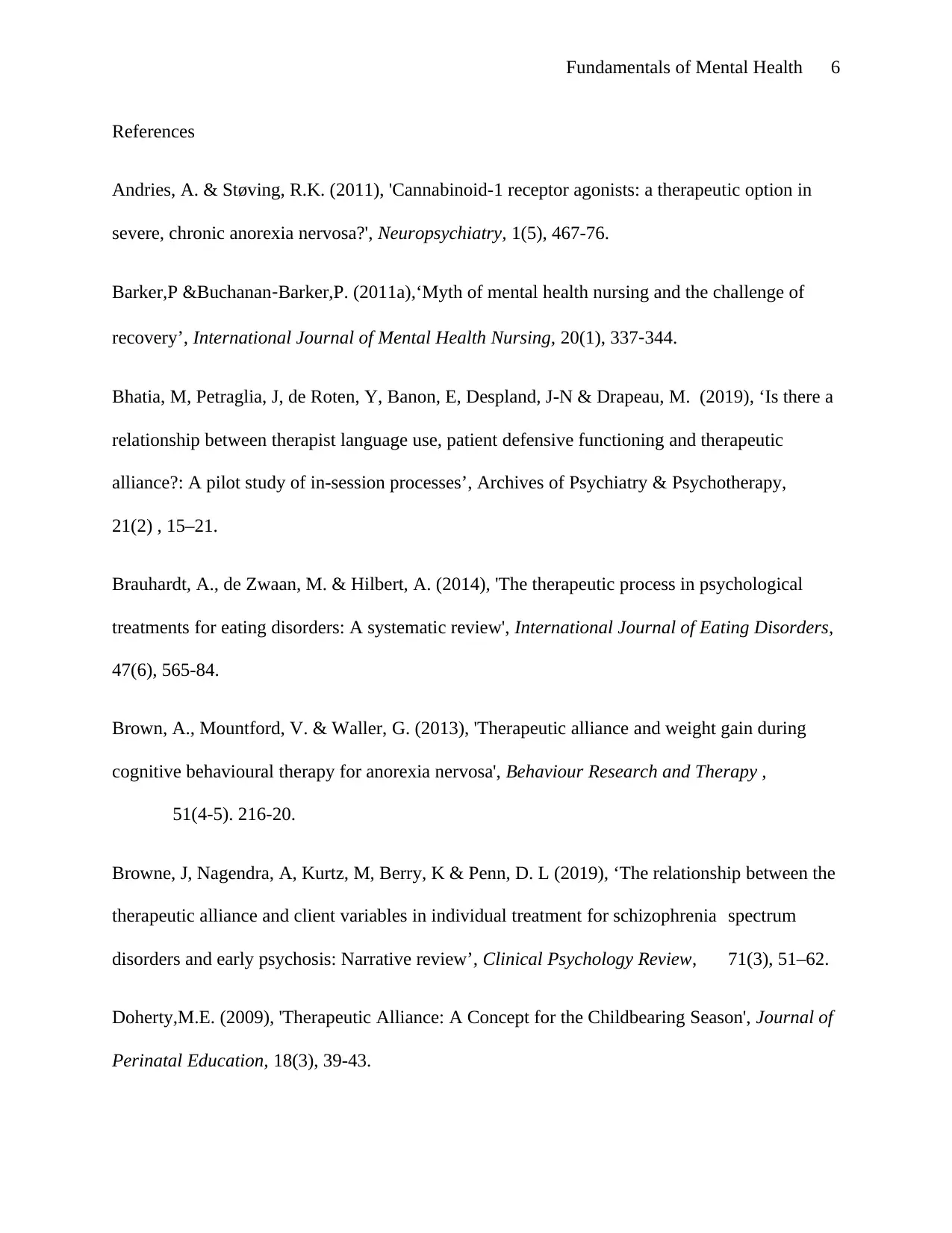
Fundamentals of Mental Health 6
References
Andries, A. & Støving, R.K. (2011), 'Cannabinoid-1 receptor agonists: a therapeutic option in
severe, chronic anorexia nervosa?', Neuropsychiatry, 1(5), 467-76.
Barker,P &Buchanan‐Barker,P. (2011a),‘Myth of mental health nursing and the challenge of
recovery’, International Journal of Mental Health Nursing, 20(1), 337‐344.
Bhatia, M, Petraglia, J, de Roten, Y, Banon, E, Despland, J-N & Drapeau, M. (2019), ‘Is there a
relationship between therapist language use, patient defensive functioning and therapeutic
alliance?: A pilot study of in-session processes’, Archives of Psychiatry & Psychotherapy,
21(2) , 15–21.
Brauhardt, A., de Zwaan, M. & Hilbert, A. (2014), 'The therapeutic process in psychological
treatments for eating disorders: A systematic review', International Journal of Eating Disorders,
47(6), 565-84.
Brown, A., Mountford, V. & Waller, G. (2013), 'Therapeutic alliance and weight gain during
cognitive behavioural therapy for anorexia nervosa', Behaviour Research and Therapy ,
51(4-5). 216-20.
Browne, J, Nagendra, A, Kurtz, M, Berry, K & Penn, D. L (2019), ‘The relationship between the
therapeutic alliance and client variables in individual treatment for schizophrenia spectrum
disorders and early psychosis: Narrative review’, Clinical Psychology Review, 71(3), 51–62.
Doherty,M.E. (2009), 'Therapeutic Alliance: A Concept for the Childbearing Season', Journal of
Perinatal Education, 18(3), 39-43.
References
Andries, A. & Støving, R.K. (2011), 'Cannabinoid-1 receptor agonists: a therapeutic option in
severe, chronic anorexia nervosa?', Neuropsychiatry, 1(5), 467-76.
Barker,P &Buchanan‐Barker,P. (2011a),‘Myth of mental health nursing and the challenge of
recovery’, International Journal of Mental Health Nursing, 20(1), 337‐344.
Bhatia, M, Petraglia, J, de Roten, Y, Banon, E, Despland, J-N & Drapeau, M. (2019), ‘Is there a
relationship between therapist language use, patient defensive functioning and therapeutic
alliance?: A pilot study of in-session processes’, Archives of Psychiatry & Psychotherapy,
21(2) , 15–21.
Brauhardt, A., de Zwaan, M. & Hilbert, A. (2014), 'The therapeutic process in psychological
treatments for eating disorders: A systematic review', International Journal of Eating Disorders,
47(6), 565-84.
Brown, A., Mountford, V. & Waller, G. (2013), 'Therapeutic alliance and weight gain during
cognitive behavioural therapy for anorexia nervosa', Behaviour Research and Therapy ,
51(4-5). 216-20.
Browne, J, Nagendra, A, Kurtz, M, Berry, K & Penn, D. L (2019), ‘The relationship between the
therapeutic alliance and client variables in individual treatment for schizophrenia spectrum
disorders and early psychosis: Narrative review’, Clinical Psychology Review, 71(3), 51–62.
Doherty,M.E. (2009), 'Therapeutic Alliance: A Concept for the Childbearing Season', Journal of
Perinatal Education, 18(3), 39-43.
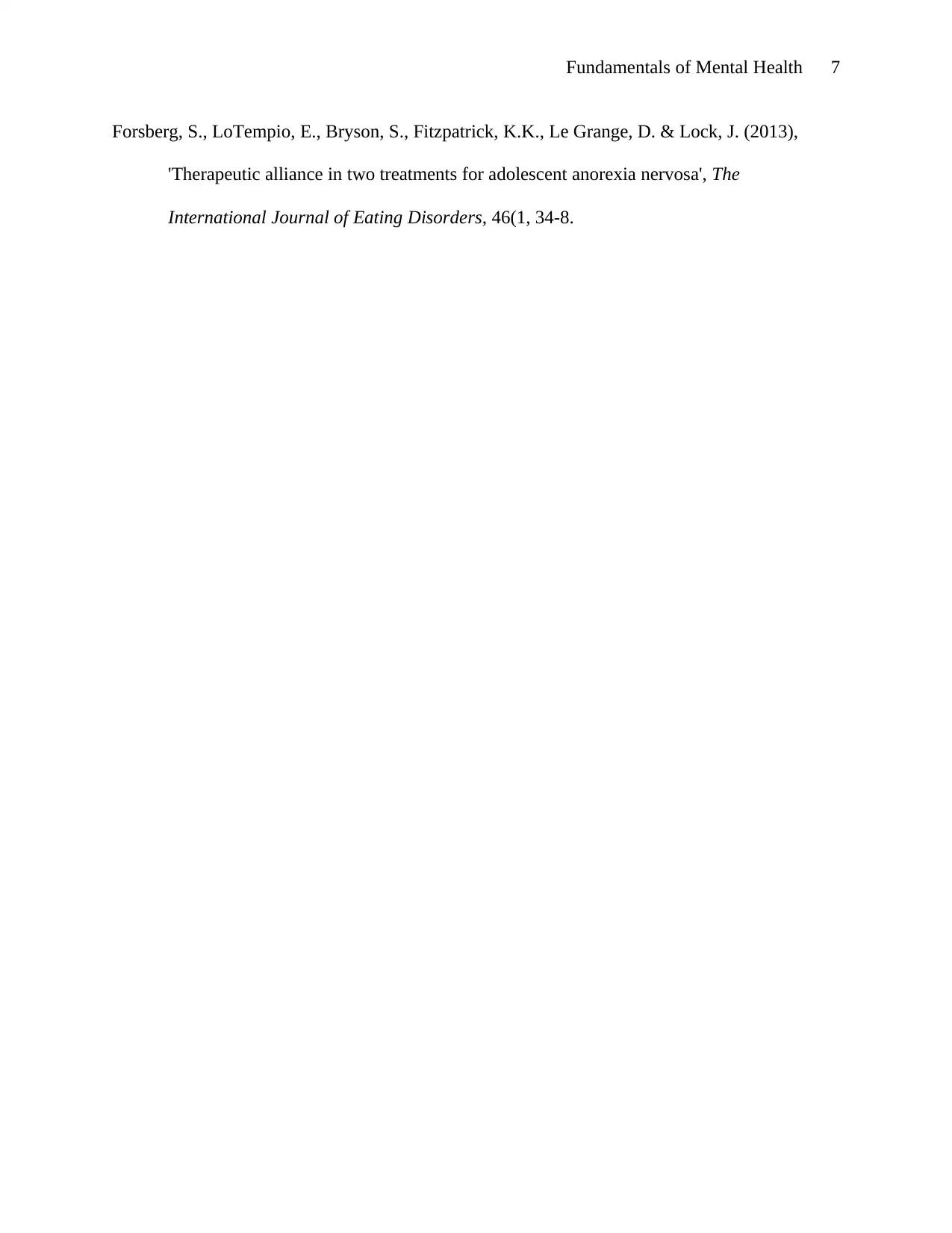
Fundamentals of Mental Health 7
Forsberg, S., LoTempio, E., Bryson, S., Fitzpatrick, K.K., Le Grange, D. & Lock, J. (2013),
'Therapeutic alliance in two treatments for adolescent anorexia nervosa', The
International Journal of Eating Disorders, 46(1, 34-8.
Forsberg, S., LoTempio, E., Bryson, S., Fitzpatrick, K.K., Le Grange, D. & Lock, J. (2013),
'Therapeutic alliance in two treatments for adolescent anorexia nervosa', The
International Journal of Eating Disorders, 46(1, 34-8.
1 out of 7
Related Documents
Your All-in-One AI-Powered Toolkit for Academic Success.
+13062052269
info@desklib.com
Available 24*7 on WhatsApp / Email
![[object Object]](/_next/static/media/star-bottom.7253800d.svg)
Unlock your academic potential
© 2024 | Zucol Services PVT LTD | All rights reserved.





